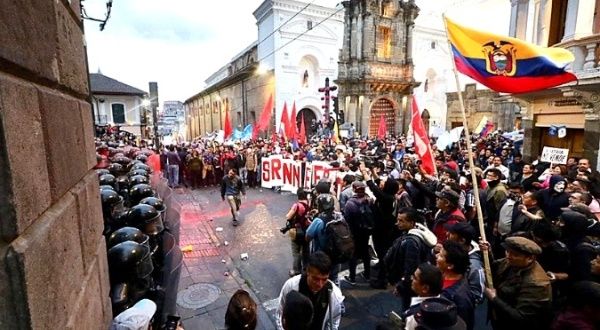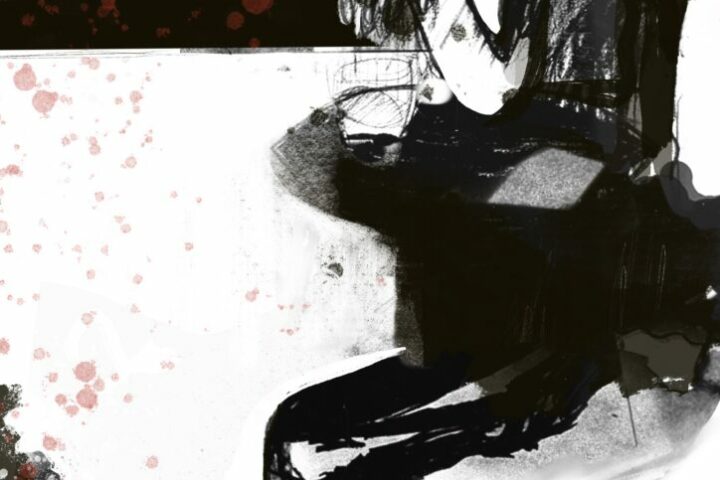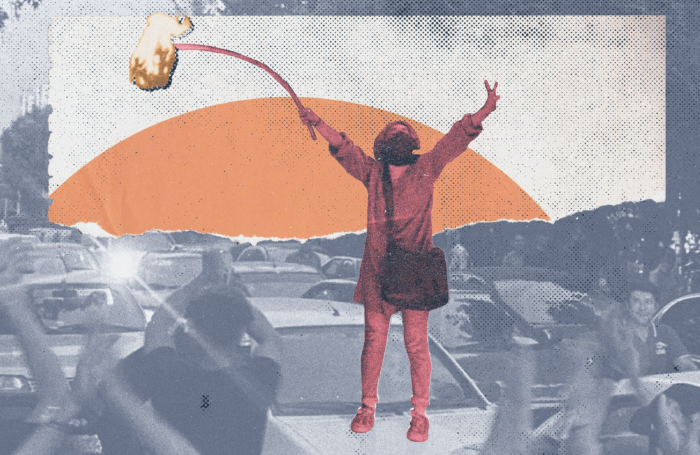Reposted from: https://democraticmodernity.com/ecuador-between-the-consolidation-of-a-police-military-state-and-resistance-from-below/
This geography, called Ecuador by the colonizers (due to the equinoctial line that crosses us) is part of Abya Yala, surrounded by Colombia to the north and by Peru to the south. Historically it has been a territory of resistance due to the European colonisation that took place more than 500 years ago, but also because of the oppression and domination of the elites, that continued to exist with the arrival of the Republic in the 1830 independence. At that historic moment, there was no talk of independence for the most forgotten and excluded sectors, the “nobodies”, who continued to be dispossessed and exploited under the name of an independent state. A state that continued to be the same repressive body led by the same powers. This independence was from the Spanish monarchy, but not from the new system that was being built. Where the independent nation-states were the new form of “legal”, “legitimate”, “rational” and “modern” domination that allowed the social and sexual division of labour, placing some states as economic powers and others as simple producers and exporters of raw materials and cheap labour. Although Ecuador continued to depend on the great economic powers, it was also strengthening old elites internally; entire families who owned the land and resources and politically dominated the country in the name of the modern nation-state, while preserving the forms of domination of the hacienda. This is how these 200 years of “independence” are taking shape.
It is precisely here that we want to emphasise what we know today as the Ecuadorian nation-state, one that is now powerfully consolidating itself into a police-military state. For this, we can develop three key points: police intelligence in prisons, repression by the forces of law and order, and the impunity that these institutions have in the face of state crimes.

From February 2021 to 2022 – during the government of the banker Guillermo Lasso – there have been eight prison massacres in the country, in which around 400 people have been killed (1) till today, no one has been held directly responsible for these murders. Almost 400 families have been broken by patriarchal violence and the mafia behaviour of a narco-state that is not only in the prisons, but also in the streets and in the impoverished neighbourhoods. 400 families had to find out through WhatsApp messages and live broadcasts that their fathers, sons, brothers, cousins, etc., were being murdered. No one has given an answer to them about what happened.
According to Jorge Núñez, an Ecuadorian anthropologist who has researched the prison system and police intelligence for 20 years, since 2015 the police began to use prisons as a place to collect information (human sources) on the drug trade (2). This information is obtained in exchange for “privileges” in prison, so they begin to divide the wards by informants, giving way to the creation of gangs. What Jorge tells us is that the prison massacres are mainly due to this exchange between the police and informants. It is well known that when there are informants, gangs take revenge and this is a consequence of the business that the police have created in the prisons.
The precarious conditions in which people are held there are inhumane and therefore, this exchange for information becomes an option for survival. Most of the people in prison are poor and racialised young people who have been abandoned by the society and the state. Young people who have only received patriarchal violence as an example and therefore continue to reproduce it because in prison – in a context of massacres – you either kill or you are killed.
The government’s response to this prison crisis has only been to increase the number of police forces in prisons, streets and neighbourhoods. Has this solved anything? No! On the contrary, violent deaths have increased, especially in the most impoverished neighbourhoods, the searches and controls are aimed at “the other” who does not comply with the rules established by the system.
It is good for the government that these massacres and violent murders are taking place, because this is how they get rid of the dispossessed, that’s why they have done nothing to stop these massacres from happening. On the other hand, the government has also taken advantage of this scenario to strengthen international ties, mainly with Europe and the Middle East. In the field of security, it is known that the Lasso government has acquired armoured vehicles and weapons from Israel to “strengthen” the institution. Meanwhile, in April this year, Turkey’s foreign minister, Mevlüt Çavuşoğlu, arrived in Ecuador with the aim of collaborating on projects against terrorism, organised crime and drug trafficking. Turkey is also expected to support Ecuador’s membership of the UN Security Council.
Free Trade Agreements (FTAs) are another point that cannot be ignored in these international alliances. Lasso has proposed concluding 12 treaties in the next three years of government, with the aim of generating greater international investment in the country, arguing that their investment can solve economic problems, cause opportunities, development and even migration. He strengthened the accession to the Multi-Party Trade Agreement with the European Union and the Inclusive Economic Partnership Trade Agreement between Ecuador and the European Free Trade Association (EFTA).
These treaties only favour the exporting elites, as those are never designed for the “small producers” or peasants, who have less and less access to native seeds or to free and fair trade. Those also generate thousands of hectares of monocultures, i.e. FTAs have a high cost in terms of environmental damage.
We can even see how they try to dominate us through our food and our bodies, generating changes in our consumption habits. Many processed products arrive, made with our raw materials, at a lower cost, but we no longer know exactly what we are eating, how it was made and what damage it can cause in our lives. The negative impacts of FTAs can also be seen in the growth of inequalities and in the privatisation of services and the basic necessities of life. This is only a small view of the alliances that exist between nation-states, alliances that are not designed to solve social needs and problems, but rather to strength the states themselves and ensure the perpetuation of their power through repression and putting the lives of the people under economic and political agreements.
Under the propaganda of “improving security”, Guillermo Lasso intends to implement a security project similar to “Plan Colombia”, which was applied by Uribism (3) – for ten years – in collaboration with the United States, causing the greatest number of murders, displacement and dispossession in the territories. It was there that paramilitarism was established and left 6,042 people dead as a result of false positives in Colombia. This same pattern is now being repeated in Ecuador: the use of the discourse of security and fear to apply a state policy of extermination and dispossession.
The second point – and which is also connected to this last idea of the use of the discourse of security and fear – is reflected in the role that the order forces (police and armed forces) have played and continue to play, not only in national strikes and mobilisations, but also when it comes to attacking the defences of territories; defences for a dignified life.
The Ecuadorian nation-state’s solution to social problems, insecurity and violence, in addition to increasing police forces, has been to increase the budget and arming of these repressive institutions. As a result of the October 2019 strike, the president on that time – Lenin Moreno – raised the budget For the National Police Force by $50 million (4), with the aim of providing more specialised equipment to combat “insecurity”; he also put forward the idea of creating a university specifically for the police. All this under the slogan that “a strong and implacable police force is needed to fight insecurity and terrorism”.
However, it seems that all this newly acquired equipment is only used when it comes to protests or demonstrations that – as mentioned before – seek to defend dignified life. During the last strike in June 2022, we could not only see, but feel all this new equipment; hundreds of motorbikes, tanks, drones, tear gas bombs and pellets, patrols and new weapons in large quantities with which they massacred the people.
The police do not fight the mafia – which openly exists in the country – they do not do so because they are part of it, just like the elites and the authorities. They are, “those at the top”, the ones in charge of pointing out enemies, and also creating them, in order to give legitimacy to their project of death. A large part of the social movement has played along with this creation of the internal enemy, allowing the most popular neighbourhoods to become militarised because they believed the hate speech about “the criminals are there” without understanding that, in these neighbourhoods, children and young people have no options in the face of an absent state and the organised crime that is increasingly taking over these territories.
The third point that connects with the previous ideas is the impunity of the forces of law and order. In the penultimate week of September, the whole country witnessed and reaffirmed that the police is an institution with impunity, that tortures, makes people disappear and murders, in the face of the femicide of María Belén Bernal, which became a state crime. María Belén was disappeared and murdered at the Escuela Superior de Policía. It was at that moment when more people understood that the forces of law and order are institutions that were created to protect those in power. To this end, they are capable of manipulating evidence, locating bodies, disappearing them… as they have done in other governments and as they did during the strikes of 2019 and 2022 that left around 18 people murdered and hundreds injured, crimes for which, until now, there has been no clarification or reparation.
With the case of María Belén it became clear, once again, that justice in a patriarchal nation-state cannot exist, because there is an entire complicit apparatus for this to have happened. She was murdered within the institution that supposedly trains those who “will provide security for the country”, but the reality is different. In this institution they deform people and turn them into tools of repression against the people, against women and the feminine. In Ecuador a woman is murdered every 28 hours. Up to the 3rd of September 206 women have been murdered (according to figures known to ALDEA (5), of which 115 were feminicides due to criminal violence. Organised crime is reflected in the violence against female bodies. These are murders that are converted into numbers because of bureaucracy and patriarchal injustice do not allow for truth, let alone reparation.
Facing this panorama, there is only one reality: we cannot continue surviving in this project of death that dispossesses our territories and our lives. It is not a question of changing a progressive government because here, as in other territories, this has already happened, and it is these same governments that have also continued to use police and military forces to maintain power. The problem is the nation-state which operates from a patriarchal, capitalist and colonial system and uses the institutions of repressive forces such as the police and armed forces to maintain its existence. Therefore, we believe that the solution is not to take the power of the state – we do not want to be part of it – we believe in the construction of other ways of life from an anti-patriarchal project, where women and female bodies live without fear; where young people do not have to decide to be killed by the police or be part of organised crime, but live in freedom and can organise themselves autonomously; where the territories are not dispossessed or plundered. Not only do we believe, but we are working for the revolution for life to make that possible.
(1) These are the prison massacres documented in Ecuador between 2021 and 2022, by Karol E. Noroña: https://gk.city/2022/07/18/seis-masacres-carcelarias-documentadas-ecuador/
(2) Interview with Jorge Núñez: https://gk.city/2022/03/07/entrevista-jorge-nunez-narcotrafico-policia-carceles/
(3) Uribism: Far-right political current in Colombia, led by Álvaro Uribe (president of Colombia 2002 – 2010). Uribe’s rising coincided with the neoliberal restructuration of the country’s economy, articulating the interests of Colombian bourgeoisie. The coalition included large landowners, big farms owners, agribusiness, drug traffickers, paramilitaries, sections of the Liberal Party, the police and military, and multinational corporations. At that time, state violence was unleashed not only against the FARC, the displacement of millions of peasants, the usurpation of their lands, massacres by paramilitary groups and the systematic persecution of dissident political sectors reached an all-time high.
(4) Government increases budget to the police: https://www.eltelegrafo.com.ec/noticias/politica/1/gobierno-aumento-presupuesto-policia
(5) Data from ALDEA (Latin American Association for Alternative Development): https://www.extra.ec/noticia/actualidad/escalofriante-28-horas-matan-mujer-ecuador-206-femicidios-2022-73023.html




